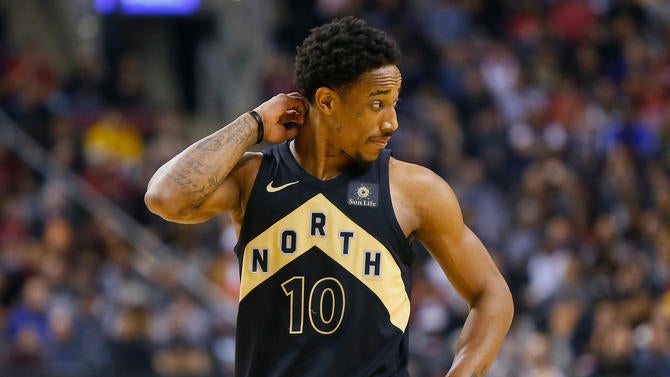TORONTO -- DeMar DeRozan is five chapters into Mark Manson's The Subtle Art of Not Giving a F***. The self-help book posits that the secret to improving your life is not relentless positivity, but rather … well, you read the title.
This might seem like an odd choice for the Toronto Raptors guard. Throughout his nine years in the NBA, DeRozan has always seemed to care. He cares about refining his game. He cares about the city of Toronto. He cares about being overlooked, having made an almost annual ritual out of responding to Sports Illustrated's top 100 player rankings. In Manson's book, though, he has found insight that applies directly to his job.
"It just shows you all the successful people in the world are successful because they didn't give a f---," DeRozan told CBS Sports. "Not in a malicious way, but more so taking risks, being OK with failing. Not giving a f--- about failing. And with that comes success, because you're not scared to fail."
The book is about focusing on what truly matters and ignoring everything else. It encourages readers to be aware of their shortcomings and confront them honestly. In his ninth year, DeRozan has done this: he has attempted 6.9 midrange shots a game, down from 10.1, and he has attempted 3.3 3-pointers a game, up from 1.7, while averaging a career-high 5.2 assists.
While his 33-percent mark won't land him in this month's 3-point contest, he opened eyes around the league when he shot a combined 10 for 17 from deep against the Bucks and Bulls at the beginning of the calendar year, scoring a franchise-record 52 points in Milwaukee. He went 1-for-6 from deep in each of his last two games, but will keep firing away.
"DeMar is a sniper now," Raptors forward Pascal Siakam said. "He's a shooter now. When you refer to DeMar, call him Shooter."
As part of Toronto's reinvention on offense, DeRozan knew his usage rate, minutes and shot attempts would drop. He embraced this and became more efficient than ever. This happened after three All-Star berths, two gold medals and one trip to the conference finals, all accomplishments that critics thought would be impossible without DeRozan significantly changing his game.
It took years of honing his footwork, ballhandling and touch to prove people wrong. To evolve, he had to let go of the idea that he had to prove anything at all.
"That's exactly what it was," DeRozan said. "You just get to that point. I wasn't going to go my whole career not wanting to shoot 3s. I didn't shoot 3s frequently. I knew I was going to get there eventually. I let it happen naturally, not something that will be forced. I never force nothing in my game. I let everything come whenever it needed to come. That's the beauty of it."

DeRozan has been called one-dimensional, overpaid and an anachronism. As a raw rookie, he learned that he couldn't let nasty tweets change his mood. Throughout his career, he took analysts' proclamations personally, making sure they knew that he was reading and watching everything. He challenged himself to defy them.
"You gotta be able to take criticism if you want to be anything close to great," DeRozan said. "Even if it's not true. You use that as an advantage for yourself. You can use that negative energy and turn that into an energy that drives you to be something more than you thought you could be. That's one thing I did."
Perhaps DeRozan needed that extra push to become a star. He believes, however that the real root of his year-after-year improvement is his dedication to early-morning workouts in the summer. As long as he keeps putting in the time for himself and his team, he has faith he can do whatever he wants to do.
"I think understanding the work, the tiring work that you put in every offseason, and the results come back and speak for itself once the season starts," DeRozan said. "And it's not because of nobody else telling me to get up in the morning to do this, to work on this, to do that. It's all you."
DeRozan always liked being an exception to the rule. "I came up different, I took a different route, I want to lead my own path," he said. He chose Compton High instead of Dominguez, USC over UCLA and has spent his entire professional career with the Raptors.
"That's my whole life," DeRozan said. "That's everything I did. Anybody who knows me, even on the outside, you can just tell I'm different from a lot of other [players], my peers, everything. I'm just -- I'm really me. I don't try to be nothing I'm not. I'm not flashy. I'm just me."
This season DeRozan has added to his repertoire, but he does not see it as any kind of compromise or capitulation. In a way, becoming comfortable shooting 3s at 28 years old fits perfectly into his narrative -- he has always operated at his own pace.
After all sorts of headlines about him being the last of a dying breed, DeRozan realizes that his shift in style has been a big story. He does not, however, see it as a big deal.
"I kind of get tired of getting asked about it," DeRozan said. "Because I always worked on it. I always did it. I just never shot 'em in the game. If I did shoot 'em, I'd probably shoot one -- If I miss, I'd probably go 10 games without shooting another one. So it made it seem like I just don't shoot it. That was never the case, that I couldn't shoot 'em. It's something I always worked on."
DeRozan still hasn't figured out why his game has been so polarizing. "I just look at everybody else like that was their fault that they couldn't see or they didn't believe," he said, adding that he never wants to waste energy trying to please other people. Of course, there are far fewer detractors to worry about now -- enough fans, executives and media members have told DeRozan that they were wrong about him that he doesn't even blink when he hears it.
"If you love me, you love my game, you love it," DeRozan said. "If you don't, you don't. That's just how I look at it. At the end of the day, I'm going to go out there and compete. And win. And that's all I care about."
Toronto is 34-15, a game and a half back of the Boston Celtics for first in the East, and it is not difficult to understand the role that DeRozan's development has played: The threat of his 3-point shot opens things up for his teammates, and his increased emphasis on facilitating is not only making him a more complete player, but paying dividends for the whole group. He has explained this in interview after interview, but he would like to make something clear: All of that is really just about one goal.
"You gotta be willing to sacrifice anything to win a championship," DeRozan said.
Last May, DeRozan's Raptors suffered a demoralizing sweep at the hands of the Cleveland Cavaliers, the same team that eliminated them in six games the previous season. They have been one of the best regular-season teams in the league for five seasons, but their offense has consistently dropped off in the playoffs. Until Toronto proves that its formula works under postseason pressure, there will be doubts that it should be considered part of the league's elite. Making the NBA Finals would end that debate.
DeRozan might not be paying as much attention to what is said about him anymore, but it is hardly as if he is searching for motivation. Now a veteran who is intimately familiar with the highs and lows of NBA stardom, he only has so many f---s to give.
"I think it's the only thing that drives you at this point now," DeRozan said. "Because you've accomplished all the fun things in your career, but you don't want to be one of them guys that had all them accolades and can never say you played for a title, you didn't have that opportunity to compete for a title. You want to live for that, the highest moment. That's to play for a championship, to be one of two teams playing and playing for it all. That's my driving force every single day."


















